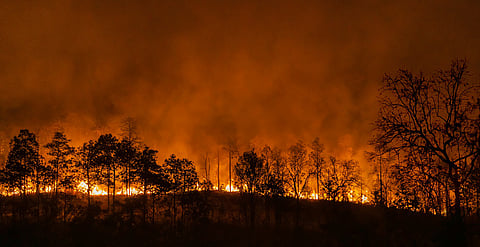

Forest and land fire management learnings from Indonesia and Peru that included community empowerment will pave way for new guidelines of tropical forest fire management, the International Tropic Timber Organization (ITTO) has said in a statement.
Projects in Indonesia and Peru provided significant insights on forest fire management, the findings of which were presented on the third day of the ongoing 60th ITTO council in Japan.
The projects, titled Capacity building on forest and land fire management in Indonesia and Forest fire prevention and response in tropical forests and forest plantations in Peru were conducted in two countries and funded by Japan.
The project in Indonesia was carried out in the provinces of South Sumatera, South Kalimantan and Central Kalimantan, where local communities were trained in fire-related activities on zero-burning.
The project involved establishing eight sites to demonstrate methods of clearing farmland without burning and increasing the capacity of local fire brigades in fire mitigation.
“A new monitoring and reporting system for fire prevention patrolling was developed and is now being applied countrywide,” the statement noted.
The post-evaluation report termed the project successful in terms of strengthening management and improving technical capacity of stakeholders in the implemented region.
In Peru, the project was implemented in five departments of the country in which over 200 members of volunteer fire brigades underwent training.
The training helped improve coordination and cooperation among national and regional authorities, who worked in tandem with local and indigenous communities in fire prevention and responding to forest fires.
The project also increased the capacity of government agencies to improve their forest fire management work and raised awareness in local communities as agents of change for fire prevention and response, the evaluation report observed.
In conclusion, the ex-post evaluation said, “The project has played a crucial role in supporting sustainable forest management by aiming to protect forest resources essential to local economies, ecosystem services, and biodiversity through promotion of alternatives to the use of fire.”
The ITTO stated that the lessons learned from the projects will form part of the knowledge base for development of field-oriented guidelines on integrated tropical forest fire management.
The ongoing activity is a joint initiative of ITTO, the Food and Agriculture Organization (FAO) of the United Nations and members of the Collaborative Partnership on Forests.
The guidelines will build on the ITTO Guidelines for Fire Management in Tropical Forests, published in 1997.